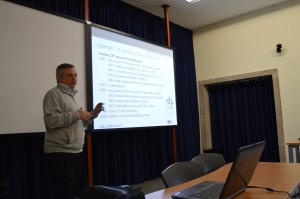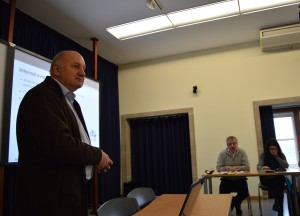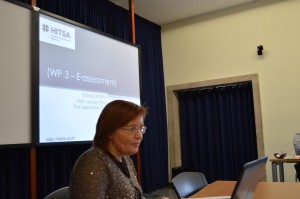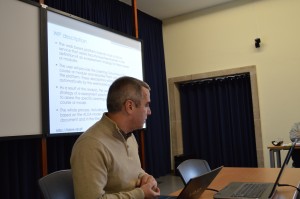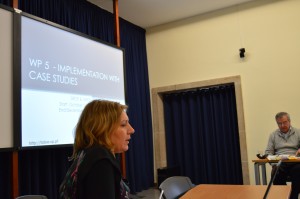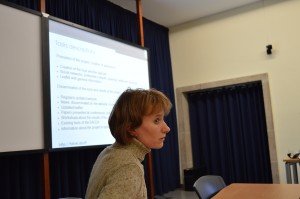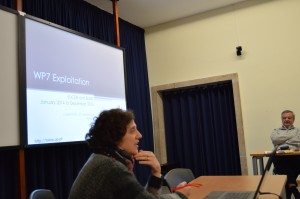WP1 – Project Management
Leader: UPORTO | Co-leader: UniPD
This work package (WP) deals with all activities related with the general management of the project. This WP defines the tools and strategies that will be used during the lifetime of the project.
The main responsibility of the WP is to have a broad perspective of all project activities and to ensure that all WPs are developing as expected.
Joint coordination of the project will be handled by the four consortium meetings where all partners will participate. Besides general coordination activities, each meeting has a well defined purpose that is described below in the deliverables section of this WP.
The consortium will set up a Virtual Platform (VP) of collaboration to facilitate the workflow of the different WPs. It is expected that partners will use the VP to work together on the deliverables of the project and to disseminate them among the consortium.
Another responsibility of this WPs is to setup communication between meetings that will be done using periodical conference calls, according to the needs of the project activities.
Finally, this WPs includes the mandatory reporting to the EACEA.
WP2 – Evaluation and quality management
Leader: GDF | Co-leader: I4F
This WP will include the qualitative and quantitative evaluation of the project. The project will be evaluated internally and externally.
Evaluation will be carried out by all partners. The project will be evaluated every six months and reports will be produced. The WP coordinator will plan the internal evaluation and will define the internal evaluation strategy. These will be shared with the Consortium during the first meeting.
The results of each internal evaluation will be discussed among partners and activities will be adjusted according to the guidelines defined by the consortium. Results of the internal evaluation will be included in the interim report.
The external evaluator will be evaluating the project at two moments of the project lifetime: middle and end. Reports of external evaluation will be included in the interim and final reports of the project.
WP3 – E-assessment
Leader: EITSA | Co-leader: UPORTO
The goal of the WP is to define the e-assessment practices that should be considered for the project and to integrate them in the ALOA model.
The first activity of the WP is to define the selection criteria for the e-assessment examples. The general intention is that the e-assessment practices should be innovative and effective. However, it will be necessary to define the specific criteria that will be used when analysing the collected examples. The second activity of the WP will be to collect relevant e-assessment practices that match the criteria. These practices may be collected from the partner institutions, from other institutions, from projects or other initiatives.
WP4 – Web based platform for e-assessment
Leader: I4F | Co-leader: SRCE
The web based platform intends to be a tool or service that assists faculty/teachers/trainers in the definition of an e-assessment strategy for their courses or modules. The user will provide the Learning Outcomes of the course or module and describe them using the tools of the platform. These descriptions will be analysed automatically by the web-based platform. As a result of the analysis, the user will obtain a strategy of e-assessment practices that may be used to assess the specific Learning Outcomes of the course or model. The whole process, including the analysis procedure is based on the ALOA model and in the literature.
WP5 – Implementation with case studies
Leader: SRCE | Co-leader: UNED
The first activity of the WP will be to define a structure for the cases-studies. The intention is to use the cases to test and evaluate the implementation of the web-based platform as a facilitator in the definition of an e-assessment strategy. It will be necessary to test the usability of the tool as well as the quality of the results.
Another activity of the WP will be the selection of potential case-studies. Cases can be any type of learning experience that has specified Learning Outcomes. It is expected that the cases selected are diverse and representative of a variety of learning contexts, including Higher Education, continuing education, vocational training, online modules, work placements and others considered adequate by the consortium. The minimum number of cases should be seven, one for each partner that is an educational institution.
After the selection is completed, the cases should be used for testing and evaluating the web-based e-assessment platform. Real users should conduct the implementation process, a teacher or a trainer working in a learning module. A member of the Consortium should follow the implementation. The process should be documented and the user should evaluate the usability of the tool and the quality of the results.
Each case should be analysed and a combined report should be prepared. From the combined analysis of the results it should be possible to obtain an improvement plan for the e-assessment platform.
WP6 – Dissemination
Leader: EDEN | Co-leader: EUCEN
This WP will have two main goals. The first is to promote the project and to create awareness. The second goal is to disseminate the tools and results of the project.
Concerning the first goal, the Consortium will create a website of the project. It will be used to disseminate general information about the project to the general public. It will be updated during the course of the project with relevant documents, news and links. Another important tool for raising awareness about TALOE will be the social networks. Finally, a leaflet will also be produced with general information about the project.
For the second goal, the previous dissemination tools will be used: the website, social networks, news and an updated leaflet. However, for this goal, additional tools will be used. The Consortium will produce papers that will be presented at conferences for discussing the results of the project. Alternatively, the Consortium will organize workshops embedded in a conference or event (European or National).
WP7 – Exploitation of results
Leader: EUCEN | Co-leader: EDEN
The WP has two main goals. Mainstreaming the results of TALOE to decision makers and the multiplication of results by the adoption of the TALOE tools by the end-users.
Concerning the goal of mainstreaming the results, the Consortium will act at different levels. At European level, the partners will participate in conferences and present results in papers or during workshops. Having EUCEN and EDEN as partners of the Consortium will also be important to reach decision makers in Higher Education and Continuing Education. The Consortium will use the tools provided by the EACEA to reach other stakeholders. The Consortium intends to establish links with other projects or institutions operating in the same field to create synergies. CEDEFOP and OECD have initiatives in the area of Learning Outomes and assessment and may have an impact in achieving mainstreaming of results.
At national and local level, each partner is responsible for contacting other institutions or projects to disseminate results. Partners will present the results of the project at national events.
In terms of multiplication of results, the Consortium will have activities focusing both at European and national levels. At European level, the dissemination activities during the second year of the project will also be focusing on engaging end-users to adopt the TALOE tools. This will be done through hands-on workshops in different event that will offer potential end-users the possibility to experience the tool, see its usefulness and encourage them to adopt it and spread the word about its existence.
In terms of national use of the tools, it is intended that the Partners will act at the national and institutional level. Partners will organize events at their institutions with the intended stakeholders. These events will help to get cases for the implementation stage (WP5) but also to reach other potential users of the tools. An effort will also be made by partners to distribute the TALOE tool among other national institutions and promote its use by teachers and trainers.
